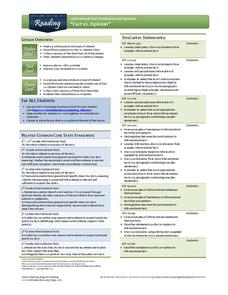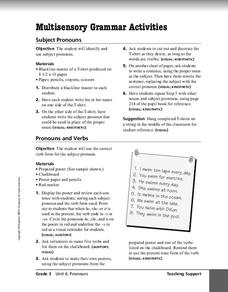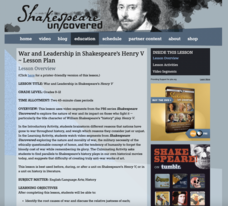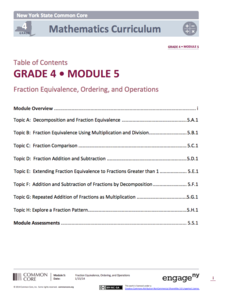Scholastic
Test-Taking Strategies for Three Subject Areas
Sometimes a test page loaded with text can make a student's face go blank. Help them decipher what a text question is asking with a series of tips focused on reading comprehension, vocabulary, and language arts mechanics.
Roald Dahl
Roald Dahl Matilda Lesson Plans
Fifty eye-catching pages contain six lessons about Roald Dahl's novel, Matilda. Each lesson has a theme and covers a different subject—literacy, social-emotional learning, science, and geography. Scholars analyze characters, examine...
For the Teachers
Fact vs. Opinion
Many informational texts are written as factual, but can your learners determine when an opinion is presented as fact? Have your kids read several articles on the same topic and record the statements that contain either facts or...
Houghton Mifflin Harcourt
Multisensory Grammar Activities
Meet your scholar's individual needs with four activities designed to address auditory, visual, and kinesthetic learning styles to reinforce the concept of subject and object pronouns.
Creative Visions Foundation
Introduction to the Universal Declaration of Human Rights
Many people don't realize that all people on the planet are entitled to certain inalienable rights. Scholars discuss the subject with the first of four lessons in the Introduction to the Universal Declaration of Human Rights series....
Creative Visions Foundation
Open Your Eyes and Ears to Human Rights Issues
A human rights defender is someone who promotes and protects human rights for all. Scholars explore the subject with the fourth and final lesson from the Introduction to the Universal Declaration of Human Rights series. Pupils share...
Columbus City Schools
ABC: Acid Base Chemistry
Bubble, bubble, boil and trouble! What causes common substances like baking soda and vinegar to react the way they do? Welcome your junior chemists to the wonders of acid-base chemistry using a comprehensive and fun...
University of Kansas
Newspaper in the Classroom
Newspapers aren't only for reading—they're for learning skills, too! A journalism unit provides three lessons each for primary, intermediate, and secondary grades. Lessons include objectives, materials, vocabulary, and procedure, and...
Curated OER
Tech Integration Project Lesson Accelerator: Project Overview
Talk about technology in the classroom. This plan has all the resources needed to create a non-linear or branching story. Included is a step-by-step tutorial that walks middle schoolers through the project description, a model of a...
PBS
Does Art Imitate Life?
Write what you know, sound advice for any writer and something many famous authors are known to have done. Use these materials to explore how Shakespeare's life influenced his plays. This resource is packed with readings, video segments,...
Shakespeare Uncovered
War and Leadership in Shakespeare’s Henry V
“Compared to war all other forms of human endeavor shrink to insignificance.” “War is not healthy for children and other living things.” These two views of war, embodied in George Patton’s statement and Lorraine Schneider‘s famous 1966...
Briscoe Center for American History
Applying the SOAPS Method of Analyzing Historical Documents
Young historians use the SOAPS (Speaker, Occasion, Audience, Purpose, Subject) method of questioning to determine the historical value of primary source documents. The third in a series of five lessons that model for learners how...
Friends of Fort McHenry
A Just War or Just a War?
What, if anything, makes a war "just"? This is an interesting and important question to explore with your class, and you can utilize an excellent lesson plan to support your group inquiry. The American Revolution and the War of 1812...
Curated OER
What Can We Learn From the Past?
What would future archeologists learn from your scholars' personal belongings? Have them bring in a box of "primary sources" from their home. Discuss the difference between observations and inference, using some of your own items to...
Curated OER
Where Did They Come From?
Give science learners nine questions about the biogeography of hydrothermal vents and turn them loose to research this fascinating habitat. Working in cooperative groups, they prepare a report that addresses each of the questions. A...
Overcoming Obstacles
Blowin' in the Wind
Working together isn't as easy as it looks! Small groups of classmates try to keep a balloon in the air using only a straw, their breath, and team communication.
Annenberg Foundation
America's History in the Making: Classroom Applications Three
How can primary sources bring history to life? Scholars create detailed lesson plans on the late nineteenth and early twentieth centuries in American history. The 17th installment of a 22-part program exploring American history examines...
Curated OER
Press Review
How can word choice affect a political speech? Middle and high schoolers examine the text of the 1999 State of the Union Address, and then determine how newspaper articles and television reports describe and analyze the event. Use this...
EngageNY
Fraction Equivalence, Ordering, and Operations
Need a unit to teach fractions to fourth graders? Look no further than this well-developed and thorough set of lessons that takes teachers through all steps of planning, implementing, and assessing their lessons. Divided into eight...
Curated OER
The Trash We Pass
Where does our garbage go? What is the difference between a recyclable and non-recyclable item? Pose these important, but often overlooked, questions to your class and invite them to consider the lasting and damaging effects of the...
National WWII Museum
Dr. Seuss and WWII
What famous children's author and illustrator created World War II political cartoons featuring such subjects as fascism, the war effort, discrimination, and the dangers of isolationism? The who in this story is Dr. Seuss, and what...
Teach Engineering
What Makes Our Bones Strong?
So is that what you meant by rubber legs? The activity has pairs subject a chicken bone to vinegar and observe what happens over a period of days. Individuals then write up a lab report and document their observations and findings.
National Endowment for the Humanities
Faulkner's As I Lay Dying: Form of a Funeral
Learners read and analyze William Faulkner's novel, 'As I Lay Dying.' They define Faulkner's place in American literary history, describe Faulkner's "South" in the context of the historical South and examine the Bundren family through...
Curated OER
What Are the Advantages and Disadvantages of Conforming?
Dive into Arthur Miller’s The Crucible and determine what it means to conform in society, and discuss as a group with the thoughts and plans available in these documents. Included are multiple activities and brain targets that form the...
Other popular searches
- Objective Subjective
- Objective Subjective View
- Objective Subjective History
- Objective Subjective Writing
- Objective Subjective Pov
- Objective Subjective Prov























